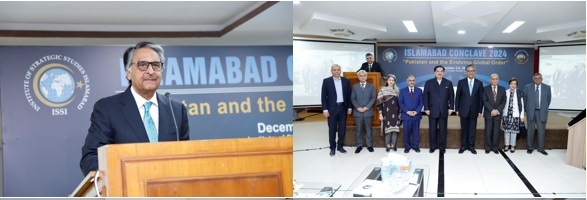
2-day Islamabad Conclave on “Pakistan and the Evolving Global Order” begins
Islamabad : Chief Guest Former Foreign Minister Jalil Abbas Jilani, in his address, lauded ISSI for transforming the Islamabad Conclave into a vital platform for policy dialogue and its contribution to research and outreach. On the Conclave’s theme, he outlined the challenges posed by major-power contestation, the escalating climate crisis, the ongoing genocide in Gaza and its tragic humanitarian consequences. He emphasized Pakistan’s power potential, strategic relevance, nuclear capability and the opportunity offered by its upcoming membership of the United Nations Security Council.
Ambassador Jilani outlined four major priorities for Pakistan: unshakeable commitment to international law and UN Charter, avoiding bloc politics, building a peaceful neighbourhood, and advocating for a fair and equitable global order. Going forward, he said that for Pakistan, the task is clearly cut out. “Our best way forward remains in pursuing a vision of “comprehensive security” that is human-centered and helps realize the full potential of our people. Further, we must continue to prudently manage the complex geopolitics and accentuate our pivot to geo-economics. And, to optimally promote these objectives, we must have proactive, imaginative and nimble diplomacy. All this would contribute to Pakistan’s emergence as a prosperous and pivotal nation in the 21st century and entail a whole range of opportunities for our spirited and enterprising youth and coming generations.”
The 4th edition of ISSI’s Islamabad Conclave, with thematic focus on “Pakistan and the Evolving Global Order,” commenced today. Former Foreign Minister Jalil Abbas Jilani was the chief guest at the inaugural session.
DG ISSI Ambassador Sohail Mahmood highlighted ISSI’s position as a premier think-tank dedicated to informed research and policy advocacy on foreign policy as well as regional and global issues. He also highlighted the Institute’s achievements in the arena of multi-stakeholder dialogue, narrative-building, and regional and international outreach. Evaluating the evolving global order, Ambassador Sohail Mahmood highlighted the twin processes of turbulence and transformation. He highlighted the growing trend towards multipolarity, the high incidence of wars and armed conflict, genocide in Gaza, erosion of adherence to international law and principles of UN charter, existential threats like climate change, role of Middle Powers and the Global South, and their quest for a just and equitable world order. He underlined that Pakistan — both as a Middle Power and an influential voice in the ‘Global South’ — espouses important priorities. Averse to bloc politics, Pakistan envisions a world in which cooperation, rather than confrontation, is the primary driver. He added that Pakistan also places greater premium on UN-centered multilateralism, as opposed to creation of smaller cliques or exclusive groupings. Equally, Pakistan favours such reform of the multilateral institutions that would make them more democratic, transparent, and accountable; not one that further fortifies the existing bastions of privilege, exclusivity, and immunity from reasonable scrutiny. As an elected member of the UN Security Council for the term 2025-26, Pakistan is poised to make its rightful contribution to the issues of peace and security on the global agenda, he concluded.
The inaugural session concluded with Ambassador Khalid Mahmood, Chairman ISSI’s Board of Governors, presenting a memento to Ambassador Jilani. The two-day conclave features interactive discussions, expert analyses, and policy recommendations on Pakistan’s geopolitical, economic, and environmental challenges and opportunities in the 21st-century global order. The Track 1.5 forum is being attended by practitioners, scholars, academics, experts, and University students.